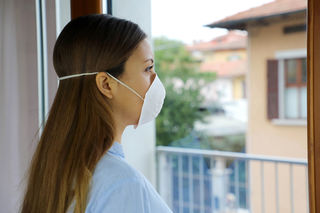Anxiety
Does Coronavirus Cause Anxiety and Depression?
A psychiatrist's hypotheses and recommendations.
Posted April 22, 2020 Reviewed by Gary Drevitch

I heard Chris Cuomo talk to his audience on his CNN show last Monday about the mental health effects of COVID infection. In his brave account, he wasn’t talking just about anxiety and depression which might result from being kept in his basement. This was something different: He literally felt that COVID-19 was changing his brain chemistry somehow. It got me thinking about neurobiological mechanisms. There isn’t much written about it, although I did exhaustive search.
There is some evidence that coronavirus does attack the brain. According to a paper by Abdul Mannan Baig, “the brain has been reported to express ACE2 receptors that have been detected over glial cells and neurons, which makes them a potential target of COVID-19” and patients have had it reported in the cerebral spinal fluid. Previous studies have shown the ability of SARS-CoV to cause neuronal death in mice by invading the brain via the olfactory system.
A new study out of Wuhan showed that one-third of patients (36.4%) showed neurologic manifestations of the disease. Compared with patients with non-severe infection, patients with more severe infection had neurologic manifestations, such as acute cerebrovascular diseases (5 [5.7%] vs 1 [0.8%]), impaired consciousness (13 [14.8%] vs 3 [2.4%]).
Either way, it is clear the brain is involved and affected, as many people are experiencing anosmia. This means the infection eliminates your ability to smell, which has to be caused by a brain infection. Headaches are an incredibly common sign reported to me by all my friends who have had COVID. You could argue this could actually be from the infection in the brain, or it could be a result of dehydration, extreme fatigue, or fever. However, the cause of the headache is not clear.
I also wonder about anxiety. People say the anxiety from coronavirus is crippling, especially at night. Some are even having panic attacks. Why is this happening to people who never had anxiety before? Although there is no actual data, I can postulate a couple of reasons.
- My first hypothesis is that this is psychological. Something as crippling as this disease leads to a lot of uncertainty and that uncertainty can lead to anxiety. Social isolation doesn’t help, as COVID patients are isolated from their families and kept in the bedroom for weeks on end. This is something most people have never experienced, but many people have encountered uncertain times and never reacted with so much anxiety.
- The second factor is that people become hypoxic. Their oxygen level goes down, and anyone with low oxygen levels will tell you this can get pretty frightening. The feeling of not being able to get enough air is like you’re drowning and not a good feeling at all. This is certainly not a feeling we are used to. People with emphysema gradually get used to it over time, but when this happens suddenly or out of nowhere, we have no defense mechanisms to guard against the horrifying feeling.
- A third postulation is this is a result of the infection in the brain. Some autopsy studies of previous coronavirus infections have shown the virus to be located in the neurons themselves. This will affect how neurons function and cause the infected to be more susceptible to anxiety and depression.
- My fourth idea is that this is a result of fever which can cause delirium, breaks of reality, agitation, and anxiety. This may also cause insomnia which can also lead to anxiety and psychosis.
Overall, I’m not sure what the exact cause is, but it is likely to be some combination of all of the factors I described, and likely more. The real question is: What we can do about it?
One thing that has been described to me is insomnia and associated high fever. The high fever is mostly being treated with the most common remedy acetaminophen, which I have not seen work as well as ibuprofen as an antipyretic (anti-fever). However, there is some unsubstantiated evidence that it may dampen the immune system and be detrimental. Yet, it could also do the opposite, and suppress the cytokine storm and be helpful. We really don’t know one way or the other. However, if the fever is not responding to acetaminophen or you have liver disease, then ibuprofen would seem to be an acceptable risk and may help with the anxiety.
As far as insomnia we can look at what has always helped people with the flu in the past. Sedating antihistamines, like Benadryl and doxylamine succinate, help dry up the nasal passages and help you sleep. Sleep is very important to prevent mental health issues, so this might be a great remedy for those who are not sleeping.
This brings us to the depression I have heard is very common with coronavirus. Essentially, there is no quick fix. Whether it is caused by social isolation, or the fact that someone may have lost their job, or that coronavirus is actually infecting the brain itself (causing neurotransmitter imbalance of serotonin and other critical neurotransmitters, or chronic hypoxemia, or fatigue, or fever) there is no fast solution other than to say: Time will heal.
So, what can you do about all of this?
- This is not a time to be complacent with hypoxemia. Get as active as you possibly can, and combat it as much as possible. Use a spirometer. And if you don’t have one, look up exercises being recommended for COVID patients. If you do not stretch out your lung tissue, you might see more permanent scarring and long-term damage. This is not 100% proven yet, but my experience with these illnesses tell me it is true.
- Think about healing from any injury. Physical therapy is critical to make sure you keep down the scarring and maintain your range of motion. Why would the lungs be any different? Physical therapy can be painful if and when it is working.
- Doing breathing exercises will help your mental health because if you expand your lung capacity, you will breathe better. If you get more oxygen to your brain, you will feel better.
- Do as much movement as you can, so you don’t end up with a deep vein thrombosis, and potentially end up with an even more complicated problem.
- For psychological treatments, say positive affirmations out loud every day. Post them on your wall. Great examples are statements like “I will get through this,” “no pain no gain,” “get up and move,” or “you are loved.” Use mediation through YouTube videos, or the Calm or Headspace apps.
- I recommend connecting with friends and family virtually as much as possible without becoming overwhelmed by too much screen time.
- Definitely stay away from too much news which can create negativity, and focus on happier media. Now is a good time to re-watch all of those Indiana Jones movies, It’s A Wonderful Life, or any other feel-good movies from your past.
If things with your anxiety and depression get really bad, then get online treatment. NY State has set up free online counseling using this hotline (I have signed up to offer my services for free as have many others): 1-844-863-9314. Always reach out and get help. You are not alone.
References
Baig AM, Khaleeq A, Ali U, Syeda H. Evidence of the COVID-19 Virus Targeting the CNS: Tissue Distribution, Host-Virus Interaction, and Proposed Neurotropic Mechanisms. ACS Chem Neurosci. 2020;11(7):995–998. doi:10.1021/acschemneuro.0c00122
Netland J.; Meyerholz D. K.; Moore S.; Cassell M.; Perlman S. (2008) Severe acute respiratory syndrome coronavirus infection causes neuronal death in the absence of encephalitis in mice transgenic for human ACE2. J. Virol. 82 (15), 7264–75. 10.1128/JVI.00737-08.
Mao L, Jin H, Wang M, et al. Neurologic Manifestations of Hospitalized Patients With Coronavirus Disease 2019 in Wuhan, China. JAMA Neurol. Published online April 10, 2020. doi:10.1001/jamaneurol.2020.1127
Ding, Y., He, L., Zhang, Q., Huang, Z., Che, X., Hou, J., Wang, H., Shen, H., Qiu, L., Li, Z., Geng, J., Cai, J., Han, H., Li, X., Kang, W., Weng, D., Liang, P. and Jiang, S. (2004), Organ distribution of severe acute respiratory syndrome (SARS) associated coronavirus (SARS‐CoV) in SARS patients: implications for pathogenesis and virus transmission pathways. J. Pathol., 203: 622-630. doi:10.1002/path.1560




